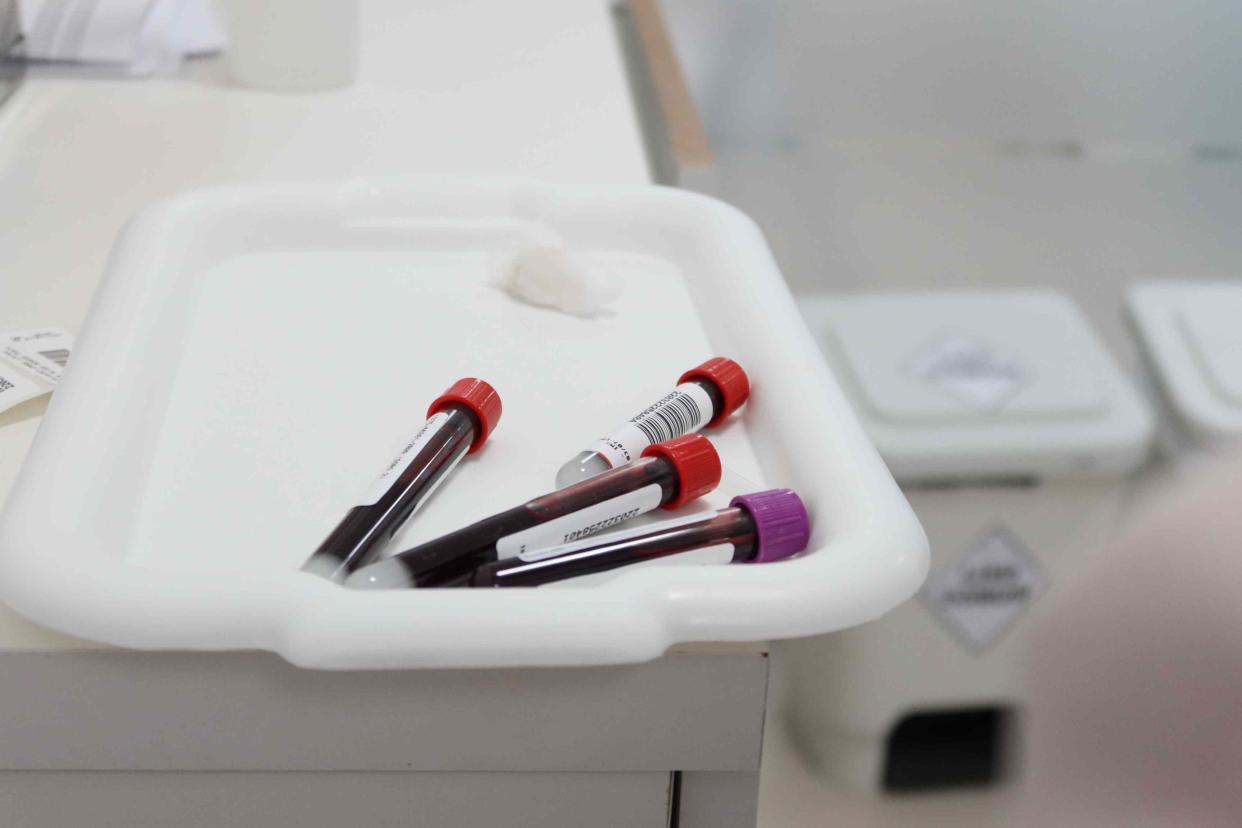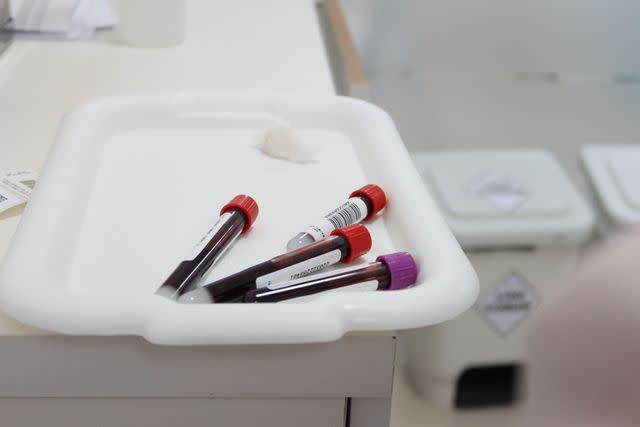What Is Hypothyroidism?

Helder Faria / Getty Images
Medically reviewed by Do-Eun Lee, MD
"Hypothyroidism" is a medical term used to describe an underactive thyroid gland. The thyroid is a butterfly-shaped gland in the neck, which releases hormones that help regulate bodily functions such as metabolism. Hypothyroidism results from the gland making and releasing too little thyroid hormone.
Learn about hypothyroidism, its symptoms, causes, diagnosis, treatment, and more.

Helder Faria / Getty Images
Hypothyroidism vs. Hyperthyroidism
Hypothyroidism and hyperthyroidism are conditions involving thyroid hormones. When the thyroid gland produces too little thyroid, it is called hypothyroidism. An overproduction of thyroid hormone is called hyperthyroidism.
Hypothyroidism (insufficient thyroid hormones) can lead to weight gain, irritability, and weak muscles. Conversely, hyperthyroidism and too much thyroid hormone can lead to weight loss, fatigue, and memory challenges.
Hypothyroidism Symptoms: How Do You Know?
Many people with hypothyroidism do not know they have it because symptoms can develop slowly over the years and mirror the symptoms of other conditions.
The symptoms vary depending on age. Hypothyroidism can delay development in children, initiate early puberty in teenagers, and lead to mental health and cognitive challenges in older adults. Hypothyroidism symptoms include changes related to the body slowing down and include the following:
Decreased heart rate
Decreased metabolism
Dry or thinning hair
Face changes such as swelling, puffiness, or heavy eyelids
Mood changes or depression
Sensitivity to cold
Speaking or thinking slowly
Thinning eyebrows
Voice changes
Related:Thyroid Disease Symptoms
A medical literature review of 50 years of studies on hypothyroidism reports that 59%–63% of men and 22%–46% of women with the disease reported sexual dysfunction. Researchers noted challenges with delayed ejaculation in men with hypothyroidism and impacts on desire, arousal, lubrication, orgasm, satisfaction, and pain during intercourse in women with the same disease. The review also found that hypothyroidism impacts libido.
Hypothyroidism Symptoms in Women
Hypothyroidism and other thyroid challenges are up to 8 times more likely for women compared to men. Women with hypothyroidism may experience heavy periods. Hypothyroidism can also make it more challenging to become pregnant because it can interfere with the ovaries releasing eggs.
What Causes Hypothyroidism?
Hashimoto's disease is the most common cause of hypothyroidism and happens when the immune system attacks the thyroid gland. Also, people with hyperthyroidism are often treated with medication to decrease thyroid activity, which can lead to hypothyroidism.
Additionally, removing part or all of the thyroid gland leads to hypothyroidism. Other causes include brain injury that affects the pituitary gland, iodine deficiency, and being born with an underdeveloped thyroid gland.
Hypothyroidism Diagnosis: What Tests Are Used?
Diagnosing hypothyroidism generally involves getting a physical exam by a healthcare provider, who will also go over your medical history. Since the symptoms are similar to other conditions, you will need testing for an accurate diagnosis.
Blood tests to measure thyroid hormone levels are often used to diagnose hypothyroidism. A healthcare provider may do a blood test to measure thyroid stimulating hormone (TSH) to look for hormone levels outside the "normal" range. Another test, radioactive iodine uptake, involves swallowing iodine and thyroid imaging.
Hypothyroidism Treatment
Hypothyroidism is a treatable condition, though minor cases do not always require treatment. More severe cases do need treatment, which often involves taking medication for life.
Treatment for hypothyroidism is crucial during pregnancy. If left untreated, hypothyroidism can lead to serious complications, such as miscarriage.
Medication
Hypothyroidism means that the thyroid gland does not make enough thyroid hormone. For this reason, many people take hormone-replacement medications.
Some hormone replacement medications for hypothyroidism include:
Synthroid (levothyroxine)
Cytomel (liothyronine)
Thyrolar (liotrix)
Synthroid is the most common medication for people with hypothyroidism.
Alternative Treatments
People with hypothyroidism may opt for various alternative treatments, which can be used alone or as complementary treatments alongside medical options. Some examples are vitamins, herbs, and supplements (such as B vitamins, iron, and omega-3 fatty acids). Mind-body practices, including meditation and yoga, may also help.
Related:Living With Hypothyroidism
Does Treatment Reverse Hypothyroidism?
Medication can help restore thyroid function but doesn't cure the disease. People with hypothyroidism may take thyroid medication their whole lives. There are cases in which hypothyroidism can go away; for example, hypothyroidism that occurs during pregnancy may last a year or less after giving birth.
How Long Do You Need Hypothyroidism Treatment?
People with hypothyroidism need treatment for as long as the thyroid gland is not making enough thyroid hormone. For most, it is a lifelong condition requiring treatment and medication.
One exception is gestational hypothyroidism, which happens during pregnancy and may go away and require no additional treatment after delivery and during the postpartum phase.
Risks of Untreated Hypothyroidism
One of the primary risks of leaving hypothyroidism untreated is heart disease, such as high cholesterol. Myxoedema coma is a severe, life-threatening complication in rare cases when hypothyroidism goes untreated. When not treated in pregnant people, hypothyroidism can prevent fetal development or lead to miscarriage.
How Important Is Diet With Hypothyroidism?
Some sources recommend people with hypothyroidism avoid certain vegetables, such as broccoli, Brussels sprouts, cauliflower, and kale, due to iodine absorption and its effect on thyroid function. However, this is a myth, and they can be eaten.
There is not enough research to support any special diet to treat hypothyroidism. However, eating healthy foods and a well-balanced diet can help maintain thyroid functioning and overall health and well-being.
Hypothyroidism and Pregnancy
When hypothyroidism occurs during pregnancy in a person who did not previously have hypothyroidism, it is called gestational hypothyroidism. This is a serious condition and can lead to complications such as miscarriage if it is not treated.
While some people with hypothyroidism during pregnancy need to be treated for life, the thyroid gland may return to functioning normally within the first year after giving birth.
Outlook for Hypothyroidism
Hypothyroidism is a treatable condition. Most people with hypothyroidism need to continue treatment for life. It generally only takes a few weeks or months for your body to respond to treatment. Once you work with a healthcare provider to establish a treatment plan and balance your thyroid hormone levels, you must follow up with a provider once a year.
Summary
Hypothyroidism occurs when the thyroid gland cannot make enough thyroid hormone for the body to function normally. Symptoms include fatigue, constipation, depression, and other changes related to slowing down the body and mind. This condition is diagnosed with a medical history, exam, and testing such as blood tests and imaging.
It can be treated with medications such as hormone replacement therapy. While most people require lifelong treatment, hormone levels can go back to normal with continued treatment, and hypothyroidism during pregnancy may go away after delivery.

